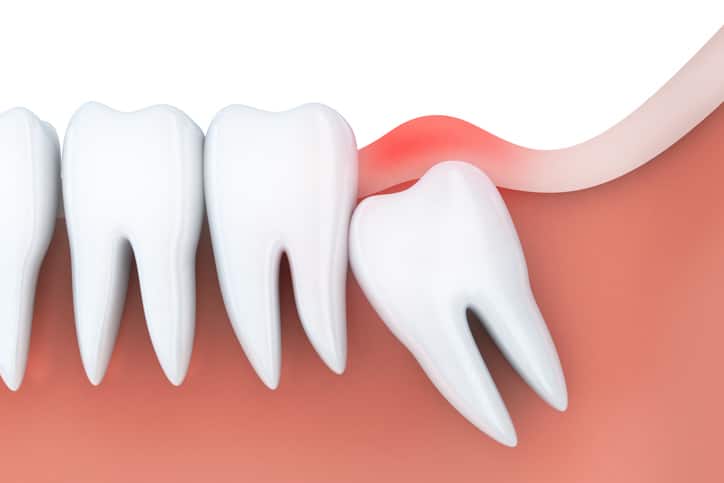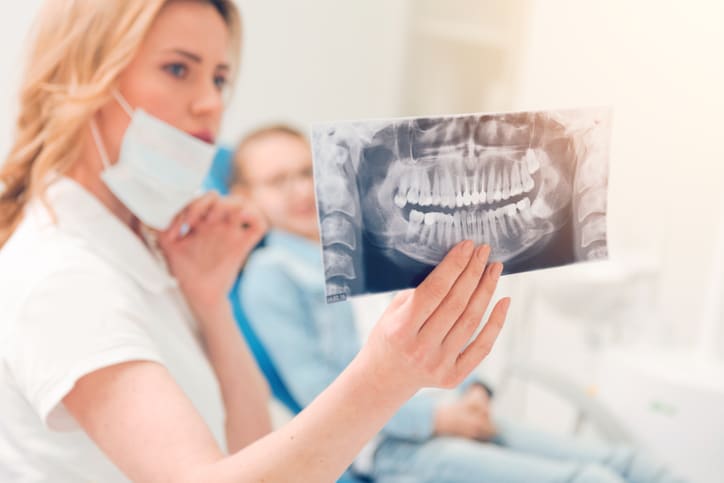There’s likely a long list of things you’d rather do than have your wisdom teeth extracted. These teeth really don’t serve much of a purpose, and you can live with them, so why undergo this daunting surgical procedure? Well, because wisdom teeth extraction can prevent you from other daunting, time-consuming and costly dental procedures. If your wisdom teeth aren’t able to probably erupt through your gums, they can lead to pain, infections, bone, gum or nerve damage, and overcrowding in your mouth. In this blog, we’ll answer all of your questions about wisdom teeth removal to ease your mind and prepare you for the process. You’ll be pleased to know it’s not as intimidating as you may think!

What are Wisdom Teeth?
First off, you may be wondering what wisdom teeth even are and what purpose they serve. You may think they’re the appendix of the mouth. A part of your body that doesn’t have a function and can be removed. It causes some people pain and discomfort, while some people don’t even notice it’s there. You’re essentially right! There are a lot of similarities between your appendix and your wisdom teeth.
Wisdom teeth are also known as your “third molars.” Thousands of years ago, our ancestors required extra teeth to help chew rougher foods. Now that we’ve evolved, we no longer need these teeth, but they still emerge through your gums, usually when we’re between 17 to 25 years old. At this stage in adolescence, your dentist will keep an eye on the four corners at the back of your mouth to determine whether or not you will need these teeth removed.

When is Wisdom Teeth Extraction Necessary?
If your wisdom teeth are “impacted,” they will need to be removed and in this case, impacted means that there is not enough room in your mouth for these teeth. It could happen if your teeth grow in at an awkward angle, or they could get trapped within the jawbone. Impacted wisdom teeth can cause pain, cysts or damage to the surrounding teeth and jawbone.
Impacted wisdom teeth also make it difficult to brush and floss your molars properly. If you can’t adequately clean your teeth, you may develop infections, gum disease and/or swollen or bleeding gums.

What is the Wisdom Teeth Extraction Process Like?
- First, your dentist will do an X-Ray to get a closer look at your wisdom teeth’s position and determine whether you will need them removed. You may need all four removed or only one, it will depend from person to person.
- If necessary, you will schedule an appointment to have them removed.
- You will receive instructions about what to do on the day of the procedure. These instructions will include taking the day off of work, ensuring you have a drive home from the dental clinic and when you can eat and drink before the surgery.
- On the day of the procedure, you will be put under some form of anesthesia. The levels include:
- Local anesthesia – you’re awake, and you’ll feel pressure but no pain
- Sedation – you’re semi-conscious but won’t feel anything
- General anesthesia – you’re unconscious and won’t remember the procedure.
- The level of sedation will depend on the severity of the procedure and your anxiety. You will discuss this before the procedure.
- Once you’ve been placed on anesthesia, the dentist will loosen and disconnect the tissue around your wisdom teeth and remove each tooth in one piece or divide them into sections if it’s easier. Either way, you will feel nothing. Once the tooth and tooth particles are removed, the site will be stitched up, and the dentist will put a gauze pad over the wound to promote clotting and healing.
- You’ll rest in a waiting room if necessary, and then your caretaker will take you home to rest and recover.

How Long Does Wisdom Teeth Recovery Last? Will I Be In Pain After My Wisdom Teeth Are Removed?
Unfortunately, you will likely experience some pain and discomfort. The severity of pain will depend on how many teeth you’ve had removed and how closely you follow the recovery instructions. Your gums and jaw will likely be a little sore, and it’ll be difficult to chew for about three days to a week following the procedure. The dentist may prescribe some painkillers to ease your pain. If not, you can take over the counter medication like ibuprofen or aceciptomen.
The extraction site will also bleed for about 24 hours following the surgery. Do not spit out the blood as you can dislodge the blood clot. Instead, replace gauze pads after few hours and rinse your mouth with room temperature water and a few teaspoons of salt. You can begin to brush your teeth and floss the day after your procedure, but be gentle and avoid the extraction site. You additionally might experience some swelling and bruising for up to three days after the surgery. You can apply an ice pack to the outside of the cheek on the side of your mouth where your wisdom teeth were extracted to help.
To avoid pain, drink room temperature water to keep hydrated. Cold or hot temperatures can cause sharp pain in your extraction site. Avoid caffeinated, carbonated and alcoholic beverages for at least the first 24 hours after the surgery. Eat only soft foods like mashed potatoes, room temperature soup and yogurt for the first few days after the surgery. Avoid hard, spicy or chewy foods for at least a week after your wisdom teeth are removed.

Dentist North York
The most crucial factor in wisdom teeth extraction is the experience and skills of the dentist. The dentists at Dentist North York are highly-trained in wisdom teeth extraction. We have been performing this procedure at our North York dental clinic since 1985! You have absolutely nothing to worry about when our talented oral surgeons extract your wisdom teeth. Book a complimentary consultation for wisdom teeth extraction in North York today!
